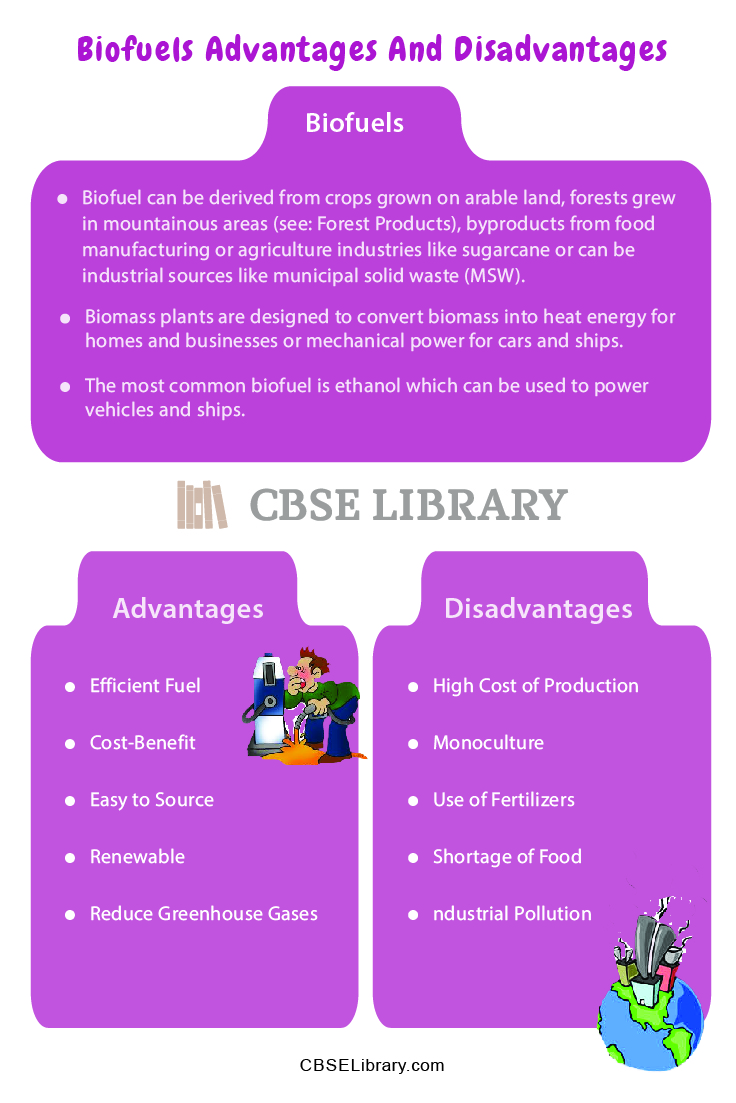Biofuels Advantages And Disadvantages: A significant problem facing the world today is the amount of power generated by harmful fossil fuels, such as oil and coal. To help ease this burden on our planet’s natural resources, many governments are starting to invest in biofuels and other renewable energy sources. Will they be able to provide enough power for the energy needs of our world? Let’s take a look at both sides of the coin in this article on biofuel’s advantages and disadvantages.
Students can also find more Advantages and Disadvantages articles on events, persons, sports, technology, and many more.
What are Biofuels?
It is primarily a biological material used as a fuel, such as trees, grasses, crops, or agricultural wastes.
- Biofuel can be derived from crops grown on arable land, forests grew in mountainous areas (see: Forest Products), byproducts from food manufacturing or agriculture industries like sugarcane or can be industrial sources like municipal solid waste (MSW).
- Biomass plants are designed to convert biomass into heat energy for homes and businesses or mechanical power for cars and ships.
- The most common biofuel is ethanol which can be used to power vehicles and ships.
- Unlike fossil fuels such as petroleum or natural gas, biofuels are considered renewable because they derive from biomass, a resource that regenerates within one year on many crop types.
- The main issues for biofuels are sustainability and energy density; however, research is ongoing to develop more efficient processes for harvesting, distributing, and converting these sources into usable fuel for automotive use.
- Advantages of Biofuels
- Disadvantages of Biofuels
- Comparison Table for Biofuels Advantages And Disadvantages
- FAQ’s on Biofuels Advantages And Disadvantages
Advantages of Biofuels
There are many advantages to using biofuels. They are renewable and sustainable, meaning they can be easily replenished. Unlike fossil fuels, there is no concern about depleting them at any time shortly. Also, biofuels do not leave behind toxic byproducts like fossil fuels do when they are burned. Another advantage is that biofuel production has a relatively low impact on land compared to other forms of fuel production.
Efficient Fuel: One advantage of biofuel is that it is a more efficient fuel than fossil fuels. It contains more energy per unit weight than fossil fuels, which means you can get more power out of less material. Also, biofuel burns cleaner than other types of fuel. This means there are fewer pollutants released into the air when it is burned.
Cost-Benefit: Another advantage is that biofuel is less expensive than fossil fuels. The cost to produce biofuel is lower than it is for other types of fuel, which means it can be sold at a lower price. Also, there are government subsidies available for those who choose to use biofuel over other types of fuel. This makes it more affordable for consumers as well.
Easy to Source: Another advantage is that biofuel is easy to source. It can be produced from a variety of different materials, including plant matter, animal fat, and even household waste. There are many different ways to produce biofuel, which means it is readily available for use.
Renewable: One advantage is that biofuel is renewable. It can be produced from materials that are constantly being replenished, such as plants. This means it will never run out, unlike fossil fuels. Also, it is sustainable, which means it can be produced without damaging other resources or harming other living things.
Reduce Greenhouse Gases: One advantage is that biofuel reduces greenhouse gases. This is because it does not release carbon dioxide when it is burned as fossil fuels do. Instead, it releases oxygen into the air when it burns. The reduction in greenhouse gases can help to slow down climate change.
Disadvantages of Biofuels
One disadvantage of biofuels is that not all biofuels can be created equally. Corn ethanol, for example, takes a great deal more energy to create than it creates itself when burned. Ethanol-production facilities use far more electricity to run than they produce in fuel.
High Cost of Production: The production of biofuels is very expensive. The cost to produce ethanol from corn is about $1.50 per gallon, which means that it takes roughly a dollar’s worth of energy to create a dollar’s worth of fuel. (By comparison, oil costs just 20 cents per gallon.) The costs are so high because growing crops requires fertilizer, pesticides, herbicides, and irrigation—all costly endeavours in their own right.
Monoculture: The production of biofuels requires vast tracts of land, which means that farmers must grow only one crop at a time. This is known as monoculture. Unfortunately, monocultures are far more susceptible to pests than mixed-crop farms. If a single pest outbreak were to wipe out an entire cornfield, for example, it would devastate not just that year’s crop but also all future crops on that plot.
Use of Fertilizers: The production of biofuels requires large amounts of fertilizer, which is often made from natural gas. (It takes about two gallons of oil to produce a single gallon of fertilizer.) This means that in addition to being expensive, biofuel production is also bad for the environment.
Shortage of Food: One acre of corn can produce about 800 gallons of ethanol, which is enough to fuel a single car for one year. But that same acre could also produce enough food to feed two people for an entire year. This means that biofuel production is depleting our food supply at a time when we need it most.
Industrial Pollution: Ethanol production requires a great deal of electricity, which is often produced by burning coal. This means that ethanol production is not only expensive but also harmful to our environment. Some studies have shown that corn ethanol can produce more greenhouse gases than gasoline.

Comparison Table for Biofuels Advantages And Disadvantages
| Advantages | Disadvantages |
| Efficient Fuel | High Cost of Production |
| Cost-Benefit | Monoculture |
| Easy to Source | Use of Fertilizers |
| Renewable | Shortage of Food |
| Reduce Greenhouse Gases | Industrial Pollution |
FAQ’s on Biofuels Advantages And Disadvantages
Question 1.
What is a biofuel give three examples?
Answer:
Biofuel is any fuel that is produced through biological processes, such as fermentation or other forms of agricultural or industrial processing. There are many different types of biofuel, including ethanol, biodiesel, and biogas. Some examples include ethanol made from corn; biodiesel made from soybean oil; biogas made from methane created by decomposing organic matter in landfills or sewage treatment plants; and methanol made from natural gas (methane).
Question 2.
What are the main uses of biofuels?
Answer:
Biofuels are mainly used as transportation fuels. They can be used in place of gasoline, diesel, or jet fuel. Some biofuels can also be used to produce electricity or heat energy for homes and businesses.
Question 3.
Is biofuel good for the environment?
Answer:
There are both advantages and disadvantages to using biofuel. While biofuel is considered a renewable source of energy, it can also take away land that could be used for food production or biodiversity preservation. On top of that, growing crops for biofuel production can also lead to increased use of pesticides, herbicides, fertilizers, or irrigation—which may have environmental impacts as well.
Question 4.
How are biofuels created?
Answer:
There are many different ways to create biofuel, but they all fall into one of two categories: first-generation or second-generation biofuel. First-generation biofuel is made from crops that have been grown specifically for fuel production, such as corn or sugarcane. Second-generation biofuel is made from non-food crops or waste products from food production (such as corn stalks).
Conclusion on Biofuels Advantages And Disadvantages
There are advantages and disadvantages to biofuels, for both consumers and society as a whole. Society will have to consider whether these issues can be mitigated through policy, technology or changes in behaviour—and if so, how. And individuals will have to weigh these concerns when deciding whether or not they’d like to drive a hybrid car, purchase E85 at their local gas station or use biodiesel in their home heating system.
